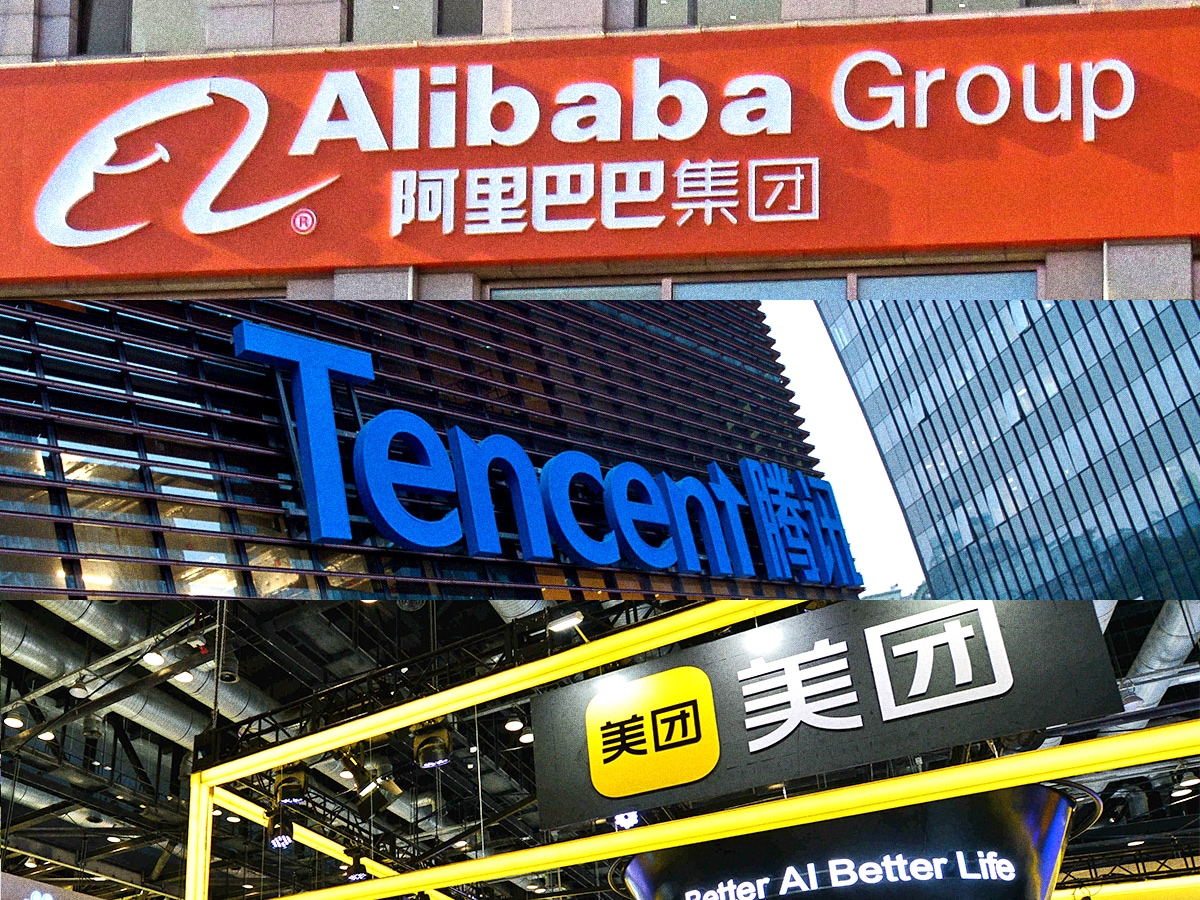Year to date, Alibaba’s [9988] share price was up a little over 22.3% through 30 November and gained just short of 60% since reaching a 52-week low of HK$167.60. Its share price is currently trading 14.67% below its 52-week high of HK$309.40, recorded on 28 October (as of 4 December’s close). Following the draft rules issued on 9 November, the stock tumbled 14% over the next two days, though Alibaba’s share price has since regained some lost ground.
As of 30 November, Tencent’s [0700] share price had jumped 50.3% since the start of the trading year and is currently up 73.1% on its 52-week low of HK$325.20 (as of 4 December’s close). The social networking and online gaming giant is currently trading 7.03% below its 52-week high of HK$633, which it hit on 9 November, only to drop away following the antitrust news.
Food delivery service Meituan’s [3690] share price has skyrocketed 184.6% for the year to 30 November and is currently up an astronomical 311.7% since bottoming out at a 52-week low of HK$70.10 during the market sell-off in March (as of 4 December’s close). Like Tencent, Meituan’s share price hit a 52-week high of HK$338.20 on 9 November but has since declined 14.7%.
184.6%
Meituan's YTD share price rise
Such was the impact of the antitrust announcement that the Hong Kong Tech Index fell by 6.6% for the year to 30 November. The impact reverberated throughout China’s tech industry and its stock markets. Shenzhen’s tech-heavy ChiNext index dropped circa 3%. The Star 50 in Shanghai fell by a similar percentage. According to The Financial Times, Chinese companies haemorrhaged $290bn in market value over 10 and 11 November.
Following the rules
The drafted antitrust rules came just a matter of days after China had indefinitely halted Ant Group’s IPO — at $37bn, it would have been the biggest IPO on record. New financial rules from Beijing now mean that Alibaba’s financial services arm has to submit a new prospectus in line with them. It’s believed that the rules could impact the group’s lending division.
China’s clampdown on the big tech and e-commerce players isn’t surprising. They’ve long been criticised for gobbling up too big a slice of the internet-based market, which has become increasingly competitive in recent years. The big players have been criticised in the past for allegedly using aggressive and unfair tactics to gain an edge over rivals and push out smaller companies.
The antitrust rules are designed to curb the monopoly, promote fair competition, and stop frowned-upon practices. The latter includes offering different pricing to customers based on their shopping history and giving preferential treatment to merchants that sell exclusively through one platform.
While the drafted antitrust rules could be amended and have yet to be passed, analysts and experts have been speculating about the impact they might have on Alibaba, Meituan and Tencent.
It is Meituan that is expected to bear the brunt of the impact. Even though it offers many services, including ride-hailing, bike-sharing and ticketing, the company has consolidated its position as a leader in the food delivery space. This is according to a note by Morgan Stanley analysts reported by CNBC.
““We note that the potential implementation of new antitrust regulations could also weigh on Meituan’s take rate charged to merchants. On the other hand, Meituan has been shifting gears to focus on promoting a food delivery membership programme to cultivate user behaviour and raise order frequency” - Morgan Stanley analysts
“We note that the potential implementation of new antitrust regulations could also weigh on Meituan’s take rate charged to merchants,” the analysts wrote, adding: “On the other hand, Meituan has been shifting gears to focus on promoting a food delivery membership programme to cultivate user behaviour and raise order frequency.”
The possibility of no exclusive partnerships with restaurants and takeaways could see Meituan’s loss become Alibaba-owned Ele.me’s gain. Alibaba has a diversified business that means it’s unlikely to be as affected as it may have been a few years ago. Supun Walpola, equity analyst at LightStream Research, argues that, while the rules may have a short-term impact on operations, they shouldn’t affect its business model.
“Given its scale and penetration, I see no reason why Alibaba cannot be successful even without practices like data collaboration, price discrimination or exclusivity clauses,” Walpola wrote in the note seen by Barron’s.
“Given its scale and penetration, I see no reason why Alibaba cannot be successful even without practices like data collaboration, price discrimination or exclusivity clauses” - Supun Walpola, equity analyst at LightStream Research
As for Tencent, the Morgan Stanley analysts believe the company’s “focus on online entertainment involves a wide-range of content innovation and can be less relevant to antitrust scrutiny”, according to CNBC. They added that any new rules should be easy to navigate but did warn that there are the issues of “potential misuse of user data across platforms” and “blocking competitors’ access to the WeChat ecosystem”.
Analysts are currently bullish on all three stocks. Alibaba has 57 ratings available, according to data by The Wall Street Journal. 51 are Buy, four Overweight and two Hold. Of Meituan’s 41 ratings, 33 are Buy, three Overweight, four Hold and one Sell. Tencent has 54 ratings, 47 of which are Buy, two Overweight, four Hold and one Sell.
Disclaimer Past performance is not a reliable indicator of future results.
CMC Markets is an execution-only service provider. The material (whether or not it states any opinions) is for general information purposes only, and does not take into account your personal circumstances or objectives. Nothing in this material is (or should be considered to be) financial, investment or other advice on which reliance should be placed. No opinion given in the material constitutes a recommendation by CMC Markets or the author that any particular investment, security, transaction or investment strategy is suitable for any specific person.
The material has not been prepared in accordance with legal requirements designed to promote the independence of investment research. Although we are not specifically prevented from dealing before providing this material, we do not seek to take advantage of the material prior to its dissemination.
CMC Markets does not endorse or offer opinion on the trading strategies used by the author. Their trading strategies do not guarantee any return and CMC Markets shall not be held responsible for any loss that you may incur, either directly or indirectly, arising from any investment based on any information contained herein.
*Tax treatment depends on individual circumstances and can change or may differ in a jurisdiction other than the UK.
Continue reading for FREE
- Includes free newsletter updates, unsubscribe anytime. Privacy policy





